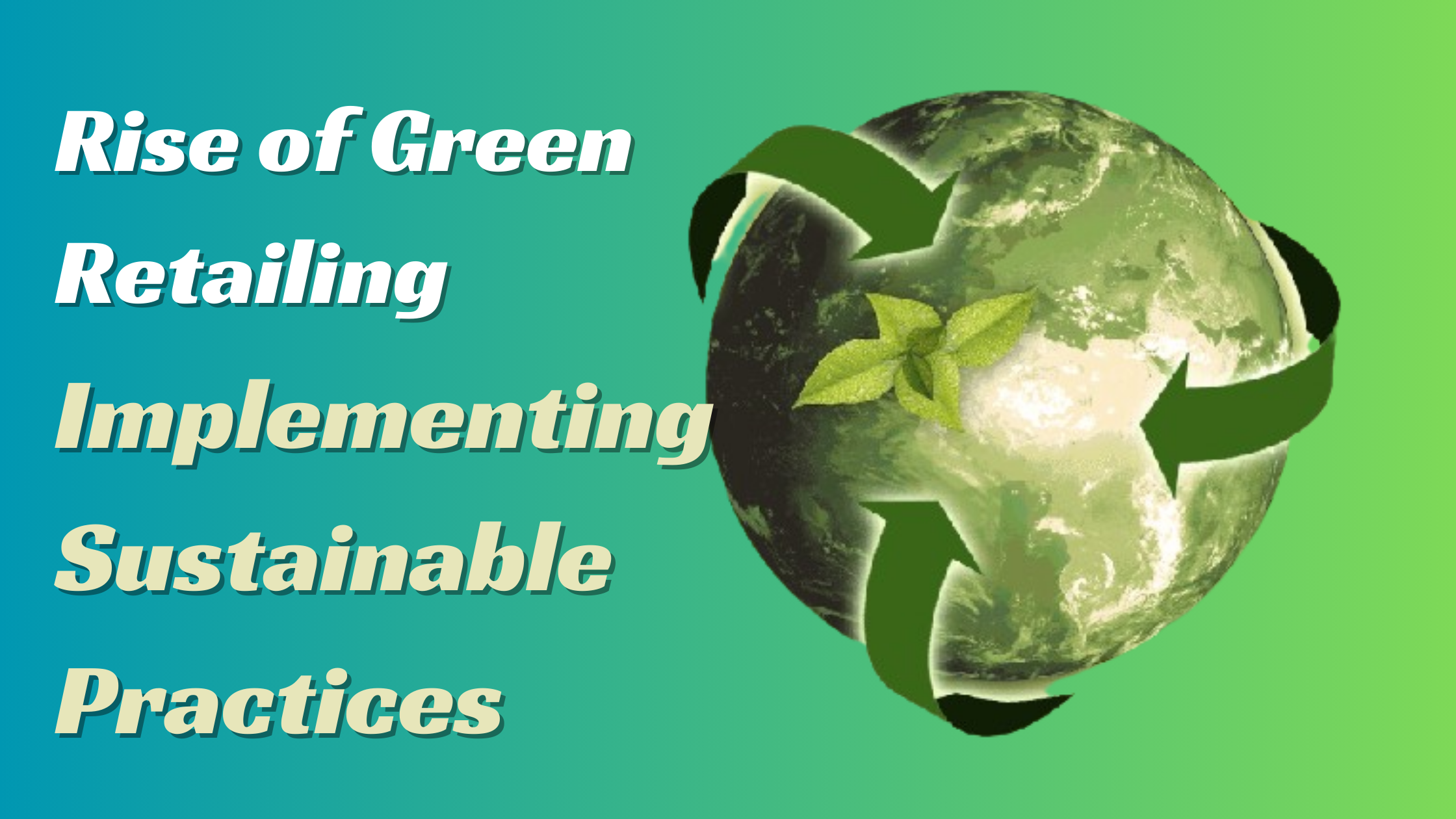The Rise of Green Retailing: Implementing Sustainable Practices
- 1 The Rise of Green Retailing: Implementing Sustainable Practices
- 1.1 Assess Strengths and Weaknesses
- 1.2 In-Store Recycling
- 1.3 Offer Green Products
- 1.4 Eco-Friendly Decor
- 1.5 Green Transportation
- 1.6 Invest in New Shelves
- 1.7 Green Electricity
- 1.8 Clean with Green
- 2 Conclusion:
- 2.1 FAQs:
- 2.1.1 Why is green retailing important?
- 2.1.2 How can retailers assess their environmental footprint?
- 2.1.3 What are some examples of eco-friendly products retailers can offer?
- 2.1.4 How can retailers encourage customers to participate in green initiatives?
- 2.1.5 What are the benefits of using intelligent shelves in retail stores?
- 2.1.6 How can retailers transition to clean energy sources?
- 2.1.7 What are the advantages of using eco-friendly cleaning products in retail stores?
In Short:
- Assess and Set Goals: Start by identifying strengths and weaknesses in sustainability efforts and set clear goals for improvement.
- Implement Sustainable Practices: Introduce in-store recycling, offer eco-friendly products, utilize green decor, promote green transportation, invest in smart shelves, use clean energy, and opt for eco-friendly cleaning products.
- Prioritize Environmental Responsibility: From recycling materials to using clean energy and offering green products, prioritize sustainability efforts to reduce ecological waste and enhance environmental responsibility in retail operations.
The increasing focus on environmental sustainability is becoming evident across various sectors, including the retail industry, where there’s a significant push towards reducing ecological waste and enhancing sustainability efforts. However, acknowledging the importance of adopting eco-friendly practices is one thing. Translating these good intentions into actionable green retailing strategies poses a real challenge. To demystify the process and offer clarity, we will delve deeper into specific methods through which retailers can adopt sustainable practices, thereby contributing actively to the growing movement of green retailing.
The Rise of Green Retailing: Implementing Sustainable Practices
Assess Strengths and Weaknesses
The first step in implementing more sustainable practices is identifying strengths and weaknesses. It starts with calculating your environmental footprint. Are you already conscious of green practices in some places? If not, what are some areas for improvement? Finally, setting goals for implementing more sustainable practices into your business is not bad.
In-Store Recycling
Recycling more is one of the first concrete steps any retailer can take. Take stock of any items in your store that can be recycled or re-used in some way. For instance, shipping and packaging materials can be recycled rather than thrown away. Other items you would otherwise throw out might be helpful for charities or organizations in your community. It’s even possible to start collecting recyclable materials in your store so they can be appropriately handled. Some retailers even offer coupons or discounts to customers who bring in recyclable materials rather than throwing them out.
Offer Green Products
Of course, nothing encourages customers to go green better than offering them green products. Not all retailers can exclusively offer green products based on their industry. But more than ever before, eco-friendly products are provided by manufacturers that operate in sustainable ways. These are the types of products that sustainable retailers should be offering and encouraging customers to buy. Even something as simple as not offering products wrapped in single-use plastic or encouraging reusable shopping bags can go a long way.
Eco-Friendly Decor
In addition to eco-friendly products, a retailer’s green initiative should be reflected in its decor. For starters, putting a lot of plants in a retail store helps to boost oxygen levels and purify the air. It can also be aesthetically pleasing for customers to see while sending the message that your store strives to be environmentally friendly. Likewise, if you plan to redecorate your retail store anytime soon, ensure it’s done with wood, paint, and other materials certified as eco-friendly. Going green is all about the fine details in many ways, so ensure everything used in your store is sustainable.
Green Transportation
Modern transportation practices contribute significantly to poor environmental practices. But with better transportation practices, retailers can go a long way toward reducing their carbon footprint. If it’s possible to make local deliveries in an electric vehicle, that’s a great place to start. Retailers can also go the extra mile by encouraging staff and customers to walk, bike, or use public transportation. Retailers can even consider giving discounts to customers who can prove that they got to the store in an eco-friendly way.
Invest in New Shelves
Believe it or not, new shelves can be a good way for a retailer to become more sustainable. The technology available with smart shelves is impressive. Smart shelves, equipped with cutting-edge technology, are revolutionizing inventory management. These shelves help ensure no inventory is wasted by highlighting products nearing expiration for promotion and tracking slower-moving items. This intelligent data usage aids retailers in maintaining the perfect stock levels, thus minimizing waste and unnecessary expenditure.
Moreover, adopting electronic shelf labels plays a crucial role in reducing the reliance on traditional paper labels for displaying prices or promotions. This shift is especially beneficial for items with frequently changing prices, as it reduces paper waste and eliminates the labour-intensive process of manually updating price tags. This contributes to environmental sustainability and streamlines operations, making it a win-win for retailers aiming to embrace greener practices.
Green Electricity
Another obvious way for a retailer to become more sustainable is to use clean energy sources. If putting solar panels on the roof is an option, this is a no-brainer for a business that wants to go green. It might be a significant investment upfront, but it’ll save money in the long run and reduce a company’s carbon footprint. Fortunately, there are other ways to go green outside of solar panels. Any retailer can use energy-efficient LED bulbs and appliances that will be better for the environment and save money on energy costs in the long run.
Clean with Green
Last but not least, all retailers can try to clean their stores with eco-friendly products. Most cleaning products contain toxins that are harmful to the environment. Unfortunately, most businesses don’t recognize that this is the case and how easy it can be to change that. A growing collection of cleaning supplies has an eco-friendly label confirming they meet specific environmental guidelines. It’s easy for any retailer to switch to cleaning supplies that use natural ingredients. Using them will be better for the environment and better for anyone who steps foot in the store.
Conclusion:
The shift towards green retailing is a critical step in addressing environmental concerns within the industry. By implementing sustainable practices such as recycling, offering eco-friendly products, utilizing green decor, promoting green transportation, investing in intelligent shelves, using clean energy, and opting for eco-friendly cleaning products, retailers can actively contribute to reducing ecological waste and enhancing environmental responsibility while meeting consumer demand for eco-conscious choices.
FAQs:
Why is green retailing important?
Green retailing is important because it reduces ecological waste, minimizes environmental impact, meets consumer demand for eco-conscious products, and enhances corporate social responsibility efforts.
How can retailers assess their environmental footprint?
They can evaluate energy consumption, waste generation, water usage, transportation practices, and product sourcing.
What are some examples of eco-friendly products retailers can offer?
Examples of eco-friendly products include sustainable materials, organic or natural ingredients, biodegradable packaging, or products that promote energy efficiency or waste reduction.
How can retailers encourage customers to participate in green initiatives?
Retailers can encourage customers to participate in green initiatives by offering incentives such as discounts for eco-friendly transportation, promoting recycling programs, and providing information on sustainable product choices.
What are the benefits of using intelligent shelves in retail stores?
Smart shelves help retailers optimize inventory management, reduce waste by highlighting expiring products, streamline operations, and minimize paper waste by using electronic shelf labels.
How can retailers transition to clean energy sources?
Retailers can transition to clean energy sources by installing solar panels, using energy-efficient appliances and LED bulbs, and exploring renewable energy options from local utility providers.
What are the advantages of using eco-friendly cleaning products in retail stores?
Using eco-friendly cleaning products reduces environmental impact, minimizes exposure to harmful toxins for employees and customers, and aligns with corporate sustainability goals.

















